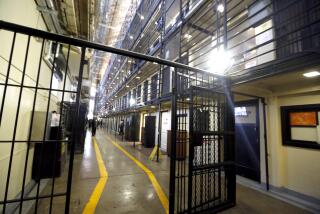The debate on solitary confinement
Treatment of prison inmates has finally begun to capture the attention of California’s lawmakers and public, in large part because two lawsuits over constitutionally inadequate medical and mental health care resulted in a federal court order to reduce the inmate population by thousands. The Dec. 31 deadline has been pushed back to February as the state negotiates with plaintiffs in the consolidated suits, and lawmakers and the administration of Gov. Jerry Brown work through plans to devote more funding to treatment and alternative sentencing for mentally ill felons. Mental illness, and its pervasiveness among criminal offenders and inmates, has emerged as a major focus.
FOR THE RECORD:
Solitary confinement: A Dec. 1 editorial referred to the isolation of inmates in “secure housing units, generally known as SHUs.” SHU stands for Security Housing Unit.
So has solitary confinement. The two-month-long inmate hunger strike at Pelican Bay State Prison brought needed attention to the use of extended isolation throughout the state’s prison system. The United Nations’ special investigator on torture, Juan Mendez, who has petitioned the State Department for permission to visit and inspect California prisons, told The Times’ editorial board this year that the state should provide better justification for sending inmates to isolation in secure housing units, generally known as SHUs. Inmates currently are confined to SHUs either for set periods, as punishment for behavior, or indefinitely, officials say, to combat prison gangs.
Those two issues — mental illness and solitary confinement — come together in harrowing fashion. Many California inmates deal with some form of mental illness, which in turn can result in behavioral problems, which in turn can get them sent to isolation. Brief periods of separation from most human contact may be necessary for an inmate’s own well-being, but extended isolation is no treatment and can hardly be deemed a useful disciplinary measure for a person whose behavior is a symptom of illness.
A 1995 court ruling in the case of Madrid vs. Gomez banned solitary confinement for mentally ill prisoners at Pelican Bay. The federal court that is overseeing California’s prisons could extend that ban systemwide. That would be a welcome development.
But lawmakers need not rely on the court. A joint legislative committee conducted hearings this year that exposed the cruelty, and foolishness, of holding prisoners in solitary for prolonged periods. As lawmakers prepare for the second half of their two-year session, they ought to work through the various definitional challenges — What constitutes solitary? What qualifies as mental illness? — and put forward a bill to apply the Pelican Bay ban to all California inmates.
More to Read
A cure for the common opinion
Get thought-provoking perspectives with our weekly newsletter.
You may occasionally receive promotional content from the Los Angeles Times.






